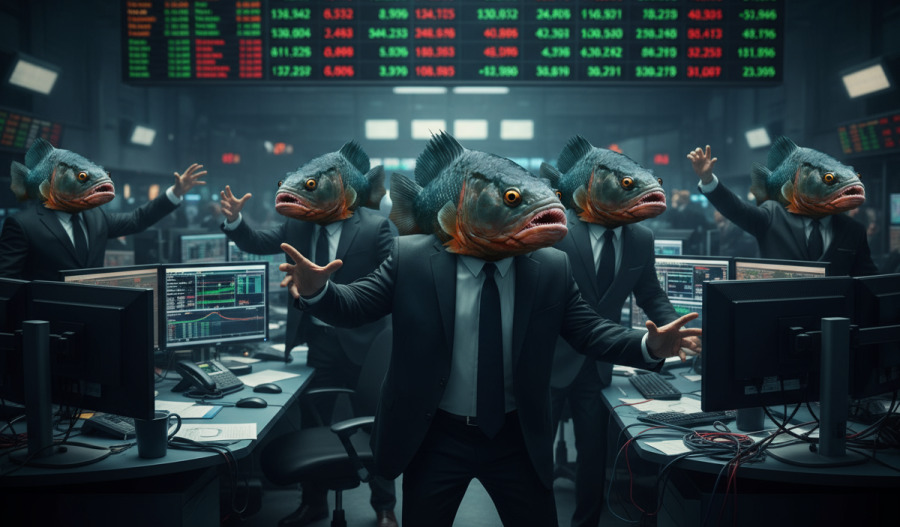All the top moves, shakes, and red-hot takes from Azzet's editorial team are right here in your weekly business wrap every Friday (10 October, 2025).
AMD's circular economy moment
As Washington lurched into its second week of paralysis, Wall Street's AI chip makers perfected the art of selling things to each other with money they'd just given each other, and gold smashed through US$4,000/oz even though the rest of the global financial system is signalling that, apparently, everything's fine.
Japan got its first female prime minister, and Israel signed a ceasefire that Hamas, Netanyahu, …and pretty much nobody else believes will last past bedtime.
Over to stocks, and this week's standout performance belonged to AMD, which saw its market capitalisation surge $100 billion in a single session after inking a major chip supply deal with Sam Altman's OpenAI.
The agreement has OpenAI deploying 6 gigawatts of AMD Instinct MI450 GPUs starting in the second half of 2026, with AMD issuing OpenAI warrants for up to 160 million shares - around 10% of the company - that vest as deployment milestones are reached.
Shares rocketed 38% at one stage as investors scrambled in, positioning the chipmaker as a core compute partner to OpenAI and helping the AI firm diversify from its single-vendor dependence on Nvidia.
The structure raised eyebrows: AMD essentially handed OpenAI $26 billion in equity so OpenAI can buy AMD chips.
Similar arrangements preceded this - Nvidia committed $100 billion to invest in OpenAI (with OpenAI using those funds to buy Nvidia's chips), and Oracle signed a $300 billion deal with OpenAI for cloud services, then ordered $40 billion in GPUs from Nvidia.
Does anyone else think that revenues arising from non-real demand fuelled by capital that the companies themselves injected might not prove fully sustainable over time?
Maybe, maybe not… as fence-sitter Goldman Sachs attempted to calm concerns by noting circular deals make up less than 15% of 2027 revenue estimates; though CEO David Solomon predicted "a lot of capital that's deployed will turn out to not deliver returns" - definitely the kind of reassurance that makes everyone sleep soundly.
I wonder what it's like to be ruled by tech bros… I guess we'll find out?
Big four consultancy Deloitte committed to deploying Anthropic's Claude across its entire global workforce of more than 470,000 employees spanning 150 countries, marking the AI startup's largest enterprise deployment since its founding four years ago.
The Amazon-backed AI tech now counts more than 300,000 business customers and hit a $5 billion revenue run-rate recently, up from $87 million at the start of 2024, following its $13 billion funding round at a $183 billion valuation.
IBM shares rose on an AI partnership with Anthropic, as Figma shares jumped 7.4% after ChatGPT integration, showing how AI deals continue to reshape tech sector valuations regardless of whether anyone's actually making money.
Washington's second week of dysfunction
The U.S. government ground through its second week of shutdown as Democrats and Republicans remained at an impasse over government spending, with Trump threatening mass layoffs and Democrats fighting to renew subsidies covering health insurance costs for millions of households.
The shutdown could haemorrhage around $7 billion in economic activity for each week it continues, with IRS employees furloughed and workers potentially denied back pay.
A recent survey found that only 28% of Democrats and 23% of Republicans believe their party's positions are worth shutting down the government - a stunning endorsement of leadership on both sides.
House Democrat Hakeem Jeffries said Republicans "have gone radio silent" since their last White House meeting, adding that "what we've seen is negotiation through deepfake videos, the House cancelling votes, and of course, President Trump spending yesterday on the golf course".
Trump also authorised National Guard deployment in Chicago and later urged arrest of Chicago and Illinois leaders, taking the diplomatic approach.
His farmer bailout was thwarted by the very shutdown he's overseeing, and he mulled an extra $12 billion clean energy funding cut - because governance resembles performance art more than policy-making these days.
Trump announced U.S. truck tariffs begin in November, urged Fannie Mae and Freddie Mac to spur homebuilders, and the EU plans to add 50% steel tariffs that could hurt UK industry.
France saw its PM's resignation plunge the country into crisis, adding to European instability.
The first phase of a peace plan for Gaza has been agreed upon by both Israel and Hamas, orchestrated by President Trump, beginning with a ceasefire and hostage deal on the anniversary of the 7 October attacks.
Trump's full peace plan is outlined across 20 points, though details remain undisclosed. Nothing builds confidence quite like opacity.
Palestinian authorities report that more than 67,000 people have been killed in the two years following the attacks, including more than 20,000 children, with dozens awaiting Israel's decision on finalising the deal as peace negotiations continued on the anniversary of the war's start.
Conservative Sanae Takaichi is set to become Japan's first female prime minister after winning the ruling Liberal Democratic Party's leadership election, defeating the more moderate Minister of Agriculture Shinjiro Koizumi in a runoff with 185 to 156 votes.
A supporter of Shinzo Abe's 'Abenomics' policies, Takaichi plans to stimulate the economy through high government spending and quantitative easing, raise the tax-free income threshold, and end Japan's petrol tax.
She has said she will carry out the trade agreement Japan sealed with the U.S. earlier this year - lower tariffs in exchange for Japanese investment in America, the traditional arrangement.
Exports and an EV retreat
The largest U.S.-based manufacturer of chip production machinery, Applied Materials, forecast a $710 million revenue hit from new restrictions on exports to China after its Bureau of Industry and Security expanded the export blacklist to include majority-owned subsidiaries of listed companies.
The company expects the rule will reduce net revenue by $110 million in the fourth quarter of fiscal 2025 and $600 million in fiscal 2026, with the Chinese market representing 35% of Applied's revenue in the July quarter - not ideal timing for losing more than half a billion in sales.
Tesla launched lower-cost models, but shares sank 4.5%, proving that even cheaper electric cars can disappoint investors, while Ferrari shares crashed after shaving EV targets by 50% and Aston Martin shares fell due to tariff uncertainties.
In positive news, PepsiCo beat estimates and named a new CFO, Costco stock rose on positive September earnings, Levi Strauss reported better-than-expected results, and Constellation Brands beat estimates amid a sales downturn.
Oracle fell on lower-than-expected profit margins - markets care more about narratives than numbers, except when they don't.
Gold hits $4,000 as Fed dithers
Spot gold prices pierced the $4,000 threshold for the first time during Asian trade on Wednesday, extending its record-breaking rally as investors poured into the precious metal.
The surge marks a 53.2% gain year-to-date, propelled by heightened concerns over looming mass layoffs among federal employees and the extended government shutdown.
Markets are now pricing in a 95.7% probability of two rate cuts at the 28-29 October policy meeting.
Safe-haven flows into both gold and Bitcoin surged as traders hedged against turmoil - when both gold and crypto rally together, you know someone's worried.
Federal Reserve officials remained divided over how many cuts would be appropriate by year-end, with participants split on whether to implement two or three total reductions in 2025.
The committee voted 11-1 in favour of a quarter-point cut at September's meeting, bringing the federal funds rate to a target range of 4%-4.25%, though a narrow 10-9 majority supported additional cuts at the final two meetings of the year.
Newly appointed Governor Stephen Miran stood alone in dissent, favouring a larger half-point cut - always nice when the new guy immediately disagrees with everyone.
As the shutdown continues, the Fed faces additional uncertainty with key agencies halting data collection, potentially forcing policymakers to make decisions with limited visibility on inflation, employment, and consumer spending - a lesson apparently lost on legislators more interested in theatre than governance.
Americans' worry about finances intensified as inflation fears rose, and mortgage activity continued its downward trend.
Diversified financial services company Fifth Third Bancorp agreed to acquire Comerica for $10.9 billion (A$16.5 billion) in an all-stock deal, creating the ninth-largest U.S. bank with assets of $288 billion.
Comerica shares rallied around 15% following the announcement, and the SPDR S&P Regional Banking ETF jumped 1% on expectations that this deal signals the start of increased M&A activity as the Trump administration eases regulations and takeover scrutiny.
Firefly acquired Scitec for $855 million in aerospace consolidation, Qualcomm bought Arduino, bringing its tech to developers, Paramount bought Free Press founder to lead CBS News, and ABB shares peaked after a robotics unit sale to SoftBank.
The U.S. government secured a 10% stake in Trilogy's S32 Alaskan copper project, demonstrating strategic mineral priorities, while U.S. rare earths rallied as China tightened supply controls and USA Rare Earth closed in on a deal with the White House for domestic processing capabilities.
Google announced plans to invest $5.8 billion in Belgian AI expansion, air traffic controller shortages caused flight delays across the U.S., and New Zealand announced plans to develop lethal weapons for export - finally diversifying beyond rugby and dairy.
Taylor Swift's "The Life of a Showgirl" smashed records at the box office, the Bucking Broncos turned a nice buck in sports franchise valuations, and American Spirit exports fell amid trade tensions affecting the spirits industry.
The SEC's Atkins downplayed private credit risk, platforms and operators face action if they fail members under new enforcement priorities, and UBS identified Miami, Tokyo, and Zurich as facing the top 2025 bubble risk in real estate markets.
Safe haven flows and super gains
Corporate America's new favourite parlour trick involves circular financing so Byzantine that even Goldman Sachs felt compelled to reassure everyone - yet back home, Australian markets played the safe-haven card as global capital fled anything resembling uncertainty.
Transurban stuck by its payout as traffic increased, and Westpac sentiment slumped to a six-month low, reminding everyone that rate cuts don't cure pessimism when your mortgage is still eye-watering.
Australia's safe-haven status attracted global capital as international turmoil intensified, international markets boosted super returns, Clime Investment's early-stage recovery showed promise, and CBOE listing approval intensified ASX's competition in exchange services.



